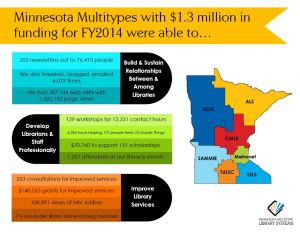 **This legislative update was written by Elaine Keefe, lobbyist for MLA/MEMO. Slight clarifications/modifications made by Patricia Post** (Received on 02/26/14 at 6:45 pm)
**This legislative update was written by Elaine Keefe, lobbyist for MLA/MEMO. Slight clarifications/modifications made by Patricia Post** (Received on 02/26/14 at 6:45 pm)
The 2014 legislative session began on 02/25/14. As is typical in a short session year, things got off to a fast start.
Library Task Force: The MDE policy bill includes a provision establishing the Minnesota’s Libraries and Service Delivery Task Force. It is charged with making recommendations to “increase service collaboration between library systems that ensures both equitable and cost-effective access to library services throughout Minnesota. Recommendations shall not be limited to physical services and should include recommendations to increase access to emerging electronic services.” I asked Kevin McHenry, assistant commissioner at MDE, about the department’s goals for the task force. He said that MDE has gotten good results with task forces on other topics and thought this would be a good way to highlight the good work that libraries are doing and to look at emerging issues like digital literacy and e-books. I brought up the e-book pricing issue that is on our platform and asked if it could be addressed by the task force. Kevin was enthusiastic about the idea, as was state librarian Jennifer Nelson in an earlier conversation.
The bill received an informational hearing yesterday in the Senate Education Committee. Senator Patricia Torres Ray, chair of the committee, asked MDE to develop some more specific language defining the charge of the task force. After the hearing I told Daron Korte, government relations director for MDE, that we would like input into the additional language and he said they definitely wanted to work with the library community.
Maintenance of Effort: Today a new version of the MDE policy bill was posted.
It still includes the task force language referenced above, but it also includes some new provisions, including one that repeals most of the MOE language in Statute 134.34 and replaces it with a cross reference to the language in the 2011 tax bill that reduced all MOE requirements to 90% of the 2011 amount and froze it into perpetuity. I have e-mailed Daron and Kevin to explain that while they may see this as clearing out obsolete language, we had hoped that eventually we could undo the freeze and return to the previous law. That will be more difficult to accomplish if the language is repealed.
Exception to the 20 Hour Minimum : The new version of the MDE policy bill includes a provision authorizing MDE to grant a public library an exception to the requirement that it be open at least 20 hours per week to receive Regional Library Telecommunication Aid if requested by the regional library system for one of the following reasons:
1) short term closing for emergency maintenance and repairs following a natural disaster
2) in response to exceptional economic circumstances
3) building repair or maintenance that requires public areas to be closed
4) to adjust public service hours to respond to documented seasonal use patterns
Data Privacy (SF 1770 / HF 2167): Senator Kari Dziedzic and Rep. John Lesch have introduced a bill clarifying that all data created, collected, received, stored, used, maintained, or disseminated by any party in performing a contract entered into with a government entity must comply with the data practices act as if it were a government entity. Contracts entered into by a government entity are still required to include a notice making it clear that the vendor must comply with the data practices act. However, if the notice is not included the vendor is still obligated to comply with the data practices act. This seems to be a much better approach than the bill that was pre-filed in January by Rep. Peggy Scott that made any contract that failed to include the notice unenforceable.
Library Accessiblity and Improvement Grants: HF 1501, our bill introduced by Rep. Mary Murphy to provide $3 million in the bonding bill for libraries, will be heard next Tuesday, March 4 at 8:15am. This is a joint hearing of the House Capital Investment Committee and the House Education Finance Committee. Pat Conley and I will testify.
Telecommunications Equity Aid: The bill is drafted and Sen. Tom Saxhaug and Rep. Kathy Brynaert will serve as our chief authors. I am in the process of securing co-authors and hope to get the bill introduced on Monday.
Elaine Keefe
Capitol Hill Associates
525 Park Street, Suite 310
St. Paul, MN 55103
office 651-293-0229
cell 612-590-1244
elaine@capitolhillassoc.com
 The MN multicounty, multitype library systems play an important role in the statewide fabric of libraries, but it is sometimes hard to explain exactly how. Why? While we all have some common focus areas, we are also tasked with responding to specific needs in our respective regions. So services can vary by region. In the case of CMLE, we respond to the needs of 320 libraries in 12 counties in Central MN. Does this sound like a tall order? Why yes it is, and the hardest part is gathering up a good picture of the regional needs. Stay tuned for a member needs assessment coming soon, where we will give you an opportunity to provide input. For now, feel free to get the big picture of multitypes by taking a look at the infographic we recently created to help legislators understand the work we do. Multitype funding has been flat for eight years, so we are making the case for a funding increase, and hope we are successful. If we are, lots of exciting possibilities are on the seven multitype wish lists!
The MN multicounty, multitype library systems play an important role in the statewide fabric of libraries, but it is sometimes hard to explain exactly how. Why? While we all have some common focus areas, we are also tasked with responding to specific needs in our respective regions. So services can vary by region. In the case of CMLE, we respond to the needs of 320 libraries in 12 counties in Central MN. Does this sound like a tall order? Why yes it is, and the hardest part is gathering up a good picture of the regional needs. Stay tuned for a member needs assessment coming soon, where we will give you an opportunity to provide input. For now, feel free to get the big picture of multitypes by taking a look at the infographic we recently created to help legislators understand the work we do. Multitype funding has been flat for eight years, so we are making the case for a funding increase, and hope we are successful. If we are, lots of exciting possibilities are on the seven multitype wish lists!


